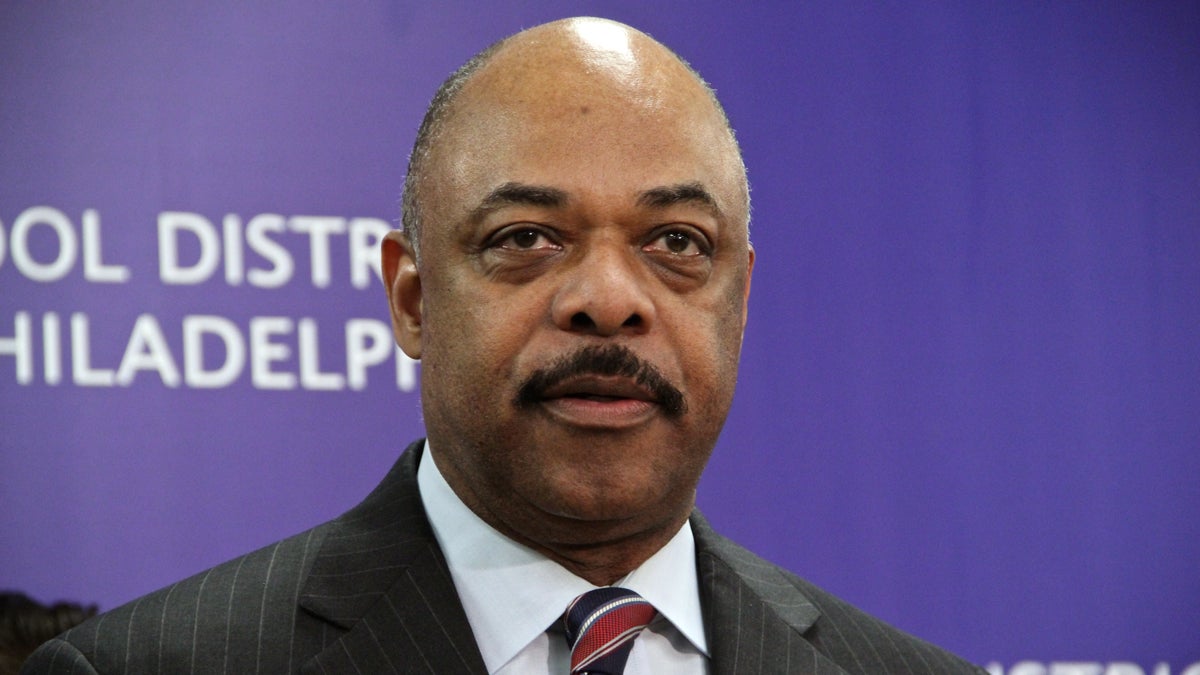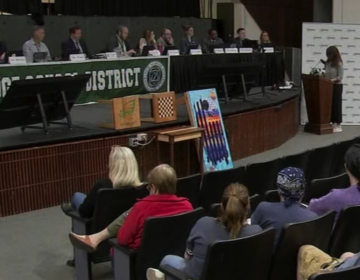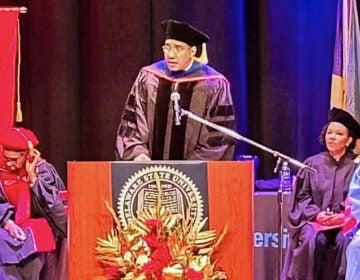One down, one looming, one to go: The state of Philly schools’ labor negotiations

Jerry Jordan has headed the Philadelphia Federation of Teachers since 2007. (Emma Lee/WHYY)
After enduring years of painful cutbacks, the union representing the Philadelphia School District’s blue-collar workers ratified a new, more lucrative contract Saturday morning.
Later this week–despite multiple delays–Philadelphia’s school administrators are slated to vote on a new deal of their own. This rare burst of sunny labor indicates that the district and its unions can, at times, play nice.
It also serves as a reminder of the labor impasse still looming over Philadelphia’s public schools. Nearly three years after its last pact expired, the Philadelphia Federation of Teachers, which represents the lion’s share of district employees, is still without a contract. And there are no signs of a new deal on the horizon.
“I wouldn’t say we’re off to the races at this point in negotiations,” says longtime PFT president Jerry Jordan.
So why is the PFT stuck in neutral while two other unions representing district employees barrel forward?
The answer likely has to do with recent history–and not the pleasant kind.
Sacrifices made
In 2012, the district faced one in a series of daunting budget deficits. To help close the gap it threatened to lay off thousands of blue-collar workers and outsource their jobs to private contractors. In July of that year, with the ax swinging, District 1201 SEIU 32BJ–which represents cleaners, bus drivers, and other service staff–agreed to a four-year contract with hefty concessions.
“It was a very difficult decision, but it was one that we believe was necessary for us to remain in our jobs,” says Ernie Bennett, director of District 1201. “We looked at it as giving back to the district in the crisis that they were in, as well. So it was a twofold situation. It helped support the school and it helped us keep our jobs.”
Fast forward to January 2016.
In late April, District 1201 opened negotiations with the Philadelphia School District. In the past, that would have been step one in a lengthy, contentious process.
“The previous history here had been negotiations would take months, if not sometimes a year or longer. And there had always been an adversarial relationship between the district and our members,” says Gabe Morgan, Vice President of SEIU 32BJ.
This time, though, both sides worked fast to strike a deal. Roughly a month and a half after talks started, the blue-collar workers had a tentative contract.
Two factors helped speed the pace of negotiations. First, the school district now has a modest budget surplus as opposed to a crippling shortfall. Second, the political climate has changed.
“There are different elected officials who are in charge of that district. And those elected officials, from Governor [Tom] Wolf to Mayor [Jim] Kenney, seem to be much more committed to actually making publicly schools work,” says Morgan. “We’ve tried to honor that commitment ourselves.”
District 1201 32BJ won’t release the details of its new contract because the two other bargaining units representing school district employees are still in talks. But the broad strokes paint a rosy picture.
In a Saturday press release, District 1201 said the new deal reverses the concessions made in 2012, triggers “significant wage increases” starting in 2017, and includes a signing bonus.
District 1201’s journey from givebacks to get-backs largely mirrors that of Teamsters Local 502 of the Commonwealth Association of School Administrators (CASA), which represents the school district’s principals and administrators.
In 2014, CASA struck a deal designed to save the school district $20 million. On Wednesday, the union’s members are scheduled to vote a four-year contract that includes, among other things, a three-percent bonus.
CASA has twice delayed voting on the pact, which president Robert McGrogan has attributed to “information that needed clarity.” But assuming CASA’s members do indeed ratify the deal, the school district will have–in the course of one week–inked new deals with two of its major bargaining units.
All of which means eyes will be back on the PFT, with one inevitable question hovering: Why have Philly teachers been left out of the contract bonanza?
Rewards
After all, the PFT should theoretically benefit just as much as District 1201 32BJ has from changes in the district’s financial situation and shifts in the political winds. But there is one key distinction: District 1201 and CASA agreed to concessions in 2012 and 2014 respectively. The PFT did not.
The PFT has instead gone without a contract since mid-2013 and endured thousands of layoffs. Jordan, the PFT president, estimates his union has lost 3,700 members since 2011.
It’s no coincidence, says School Reform Commission member Bill Green, that the two unions who offered concessions in the past are being rewarded in the present.
“The SRC or a majority thereof, took the position that we are not going to settle with PFT until we settle with CASA and 32BJ who were there for the school children of Philadelphia when the school children of Philadelphia needed them,” says Green.
District officials, meanwhile, made certain to reference concessions District 1201 32BJ made in 2012 when announcing the new contract on Saturday.
“Four years ago 32BJ members stepped up in a time of crisis and put the students of Philadelphia first,” said superintendent William Hite in a statement. “This contract recognizes the tremendous contributions that these members have made which provided the District with over $100 million in real dollar savings.”
The PFT argues its members have sacrificed plenty. By going without a labor pact, teachers missed out on step increases or raises of any kind. When a union operates sans contract, all employees are frozen at their current wage.
“Expenses are going up for our members, and not having any type of a raise in four years, they’re feeling it,” says Jordan.
The union estimates it has saved the district over $100 million by forgoing wage hikes. Those savings, however, came by default–not because the PFT actively offered them. Green believes that’s a key distinction.
“CASA made concessions. 32BJ made concessions. Now that we have some extremely limited resources they will get contracts recognizing that they made concessions we needed them desperately,” says Green.
Gridlock
Neither side seems to think a new deal is imminent. The PFT and the district last met a “couple of weeks ago” through a state mediator, according to Jordan. Before that, Jordan says, it had been several months since the two parties talked.
One complicating factor: The state supreme court has yet to rule on whether the SRC acted legally in 2014 when it unilaterally cancelled the PFT’s contract. Lower courts have sided with the PFT.
Publicly there are only broad indications of the areas where the PFT and district disagree. In a statement at the latest SRC meeting, Bill Green said that the district was focused on changing teacher work rules. He also accused the PFT of favoring layoffs over concessions because “laid off teachers can’t vote for union leadership.”
Asked about those comments, Jordan shot back.
“I have no idea what Bill Green is talking about,” he said. “At no point was there a discussion in this organization to allow people to be laid off in order to avoid concessions.”
The back-and-forth between Green and Jordan was simply the latest in a war of words that dates back years–and shows no signs of abating. Even a fresh injection of money can’t heal old wounds, or flush bad blood.
Correction: An earlier version of this article stated that three different unions school district employees. There are five. Police in Philadelphia schools and cafeteria workers each have their own bargaining units.
WHYY is your source for fact-based, in-depth journalism and information. As a nonprofit organization, we rely on financial support from readers like you. Please give today.





